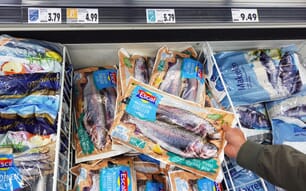In 2007, the UK exported seafood valued at £982 million and imported £1.9 billion’s worth of seafood products. And it would appear we are consistently unadventurous in our taste and choices, sticking with the species we know and love instead of trying something different.
Although UK consumers are becoming more ambitious in other areas, we are still very particular when it comes to choosing seafood. More unusual species such as crab and scallops are mostly exported, as well as more popular varieties including salmon, mackerel and herring.
* "An increasing diversity of consumer taste in the future means that the industry can continue to fish sustainably for a wide variety of seafood" |
|
Dr Jon Harman, Development Director at Seafish
|
Proving we are real creatures of habit, in 2007 the UK imported £1.9 billion worth of seafood, with cod, haddock and tuna among the most imported species. Although the UK produces excellent crab and langoustine, we export most of these, rather than consume them ourselves. Other British species enjoying popularity abroad include salmon, mackerel, herring and monkfish. France and Spain are our biggest customers – importing 39% of UK seafood, worth £386 million in 2007.
Dr Jon Harman, Development Director at Seafish, said: “When it comes to seafood, there’s a huge divide between the UK and the rest of Europe. The majority of British people stick to their favourites - mild-tasting fish, such as cod and haddock. Meanwhile, Europeans covet our oil-rich fish and shellfish, paying top prices for it on the export market.
“While the popularity of celebrity chefs and cooking programmes has had an impact on adventurous shoppers, on a day-to-day basis British people are fairly unswerving in their buying behaviour.”
Seafish says there is a great opportunity for consumers to become increasingly daring with the options on their doorstep.
“With UK waters offering at least 100 different species, an increasing diversity of consumer taste in the future means that the industry can continue to fish sustainably for a wide variety of seafood,” continued Dr Harman.
“What’s more – much of our own landed species contain high concentrations of healthy Omega-3 oils. In August, our research highlighted that lesser-known species such as prawns and brown crab were rated as being “excellent” sources of Omega-3 – along with the well-known sources such as mackerel and herring,
In 2008, Seafish reported that some lesser-known species – such as gurnard, squid and dab - have already seen substantial increases at a retail level.
“Those interested in trying new seafood have already taken the bait,” says Dr Harman, “but there is still scope for many more shoppers to try species such as hake, langoustine, crab and herring. These are delicious alternatives to our old favourites, cod and haddock. “


